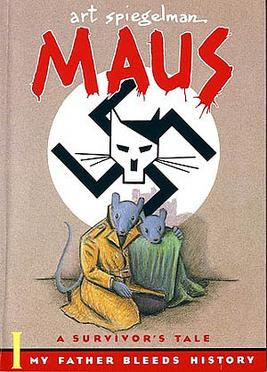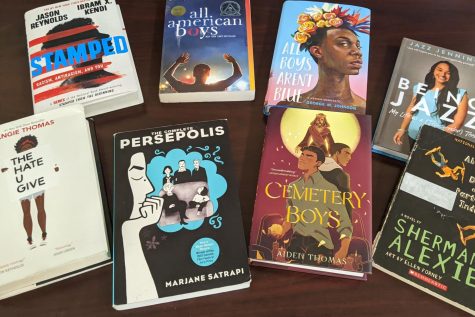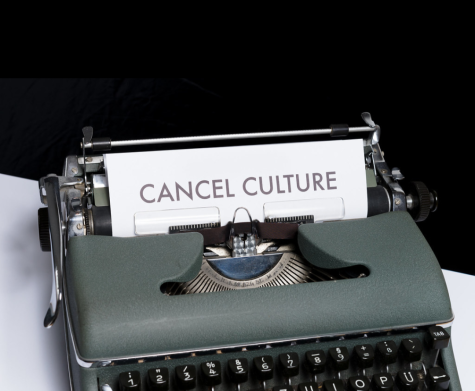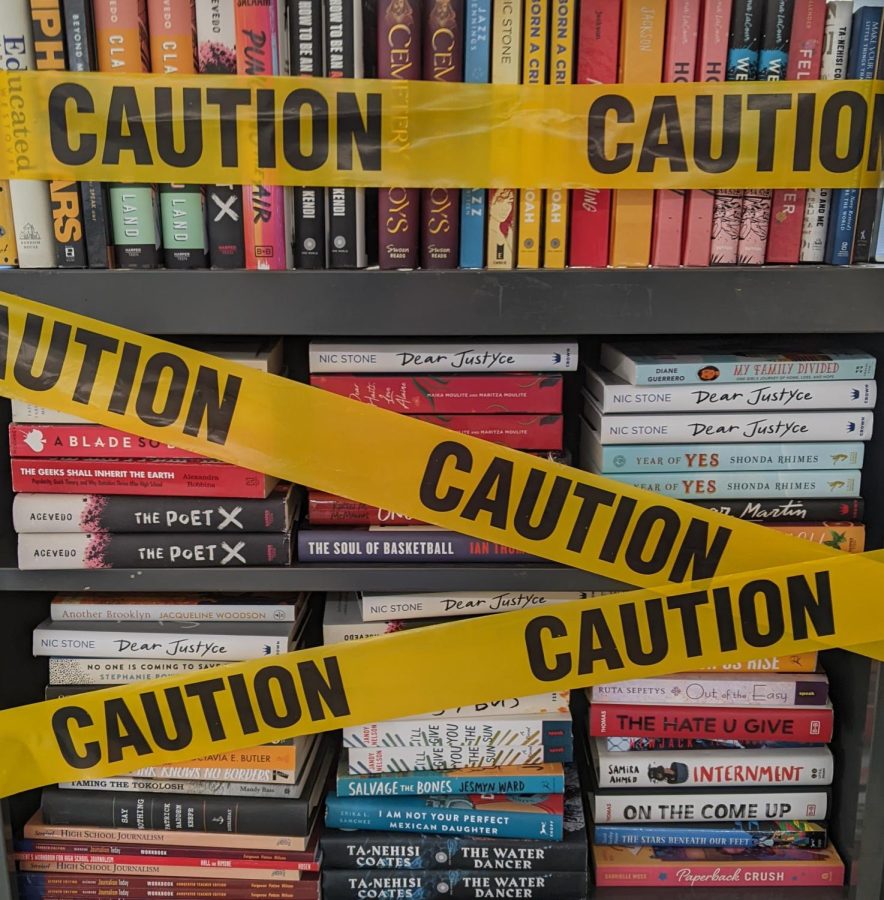So…We’re Banning Books Now?
Banning books is on the rise in the American school system.
March 8, 2022
We Went From Canceling Influencers to Banning Books…What’s Next?
Lately, the bookshelves in American schools have been looking a little…sparse. Although book banning has been around since the late 16th century, it has become increasingly ubiquitous in the last few years. As the conversation about banning and censoring certain books become more and more heated, one has to ask the question, “WHY exactly are we banning books”?
According to a new American Library Association report, there were 330 “book challenges” in the fall of 2021. “Parents, activists, school board officials and lawmakers around the country are challenging books at a pace not seen in decades,” the New York Times reported last month.
 I was first ignorant of this issue prior to finding out that the Holocaust graphic novel Maus, recently introduced to me in my AP Seminar course, was banned by a Tennessee school board in February 2022. Spiegelman’s graphic novel series “Maus” connects and describes his father’s experience during the Holocaust and the post-genocide reverberations within their family.
I was first ignorant of this issue prior to finding out that the Holocaust graphic novel Maus, recently introduced to me in my AP Seminar course, was banned by a Tennessee school board in February 2022. Spiegelman’s graphic novel series “Maus” connects and describes his father’s experience during the Holocaust and the post-genocide reverberations within their family.
The book takes a generalized historical event such as the Holocaust and shifts the perspective, giving the readers an opportunity to see what life in Nazi Germany and Auschwitz was like from a personal viewpoint. Maus depicts Jews as mice and Germans as predatory cats to convey a powerful message of the unspeakable, yet nonetheless real lives of Jewish people who suffered during the reign of Hitler from 1933 to 1945.
When Art Spiegelman’s Pulitzer Prize-winning Holocaust graphic novel “Maus” was banned in a Tennessee school district last month, he readily acknowledged: “This is disturbing imagery. But you know what? It’s disturbing history.” It’s a profoundly uncomfortable subject to learn about, and that’s the point.
Art Spiegelman has recently given a speech in regards to his book being removed from the Tennesse school board. “Even if they say they’re willing to teach the Holocaust, they want a fuzzier, warmer, gentler Holocaust that shows how great the Americans were,” he said.
It might be tempting to soften the horrors of historical atrocities in the name of making them more easily digestible for children, what historical fiction author Gwen Katz calls “pajamafication”, but that hinders our ability to understand and learn from our history. Has it really gotten to the point where we have to limit “sensitive” or “problematic” books in the classrooms to “protect” our children? What exactly are we protecting them from? The truth? Reality?

It is shocking to know the reasons why certain books were banned. Here are a few for reference:
“Thirteen Reasons Why” by Jay Asheri: Addresses teen suicide.
“The Hate U Give” by Angie Thomas: Has profanity and it was thought to promote an anti-police message.
“Speak” by Laurie Halse Anderson: It was thought to contain a political viewpoint and it was claimed to be biased against male students, and for the novel’s inclusion of rape and profanity.
“Stamped: Racism, Antiracism, and You” by Ibram X. Kendi and Jason Reynolds: Because of the author’s public statements, and because of claims that the book contains “selective storytelling incidents” and does not encompass racism against all people.
“The Bluest Eye” by Toni Morrison: it was considered sexually explicit and depicts child sexual abuse.
“George” by Alex Gino: contains LGBTQIA+ content, conflicting with religious viewpoints, and not reflecting “the values of our community.”
“Drama” written and illustrated by Raina Telgemeier: LGBTQIA+ content and for concerns that it goes against ‘family values/morals.’
“1984” written by George Orwell: Contains pro-communist and sexually explicit content.
These books are just a few among hundreds that have been challenged in schools across America. Notice how it is not just history-related books that are targeted, but any literature containing elements of racism, violence, religious views, political views, sexual content, family content, abuse, conflicting stereotypes, and more of the same. It seems that the underlying reason for these events is not just simply restricting inappropriate literature in school (which is also hard to draw the line as viewing something as ‘inappropriate’ can easily be a subjective judgment) but more so an attempt to control what kids can look at, what kids can read, what kids can see… in a way that makes them less able to think.
I am in no way saying that young children should be encouraged to read intense/explicit literature because of course, you have to factor in age and maturity among other things. However, I am saying that as children get older, especially as students enter middle school and high school, we become more exposed to the world and culture within our school environments. Consequently, children are naturally going to ask more questions about this world they live in. Although these novels are not always intended to be a teaching tool, the personal element often sewed into these stories can help to give a broader perspective to students and therefore a deeper understanding of certain issues/topics/cultures/etc.
If the classroom is presented as a “safe space,” then students should be able to have respectful discussions and ask genuine questions about things even if they are “taboo” or “sensitive” because inevitably, if a guardian or trusted adult stifles a child’s query, they will just turn to the internet (which we often rely on anyways), and we all know how that ends up. In the real world, not everyone will agree with you, not everyone will like or dislike the same things as you, and not everyone will share experiences with you. This is reality and children should be raised to understand and appreciate that.
The issue is not the content of the books; people can write whatever they want to write about. No doubt, students should NEVER be forced to read or talk about something they are uncomfortable about, but in the same way, that right and freedom should not be taken from them. Fortunately, the Amityville School District has been fighting this book banning wave as we continue to promote and support our diverse community. It is a shame that cancel-culture has completely consumed the media as of late, and that tension is spilling over into all other social aspects like literature and multimedia products, to name a few.

In a nutshell, cancel culture is, at least hypothetically, the idea that people should be shunned for ideas or actions that others find disagreeable. The reason why this is so dangerous (and downright illogical ) is that it alludes to the fact that if a person does not think/act/believe the same thing everyone else does, they should be ostracized. Now when you apply this ideology to something as unique and varied as literature, won’t the result just be a bunch of texts that sounds the same and promotes the same ideas as the other? Will this not result in a world of clones, where everyone thinks the same way? Then one would have to consider how this would affect different cultures, races, religions, people groups, and minorities…how will our children be raised? How would the government operate? Would the First Amendment still be necessary if everyone agreed with everyone? I could go on and on, but do you see how this is a rabbit hole?
The world is a diverse place, and with diversity comes disagreement which is reflected in every aspect of human life. Instead of trying to subdue this natural phenomenon, why not embrace it? It provides an opportunity to grow and learn from others who are different than you. It prevents us from being egotistical and self-centered as we look at the world through another’s lens. It broadens our understanding and appreciation of the complexities and irregularities of the world and its inhabitants. It teaches us to be more loving and kind regardless of how we perceive others because, at the end of the day, we are all individual human beings coexisting on this planet called earth.
Besides, controversial literature is the least of our problems… maybe if we put more energy into solving the root issue of the circumstances that caused these books to be written in the first place, society as a whole will reap a greater benefit.

